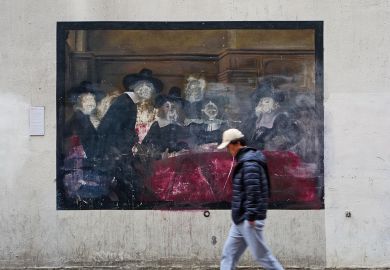One of the top prizes in British academia - the Regius professorship of modern history at the University of Cambridge - has gone to Richard Evans. His appointment coincides with the completion of a major scholarly landmark, his trilogy about the Nazi regime. The final volume, The Third Reich at War, is published later this month.
Long acclaimed as a historian of modern Germany, Professor Evans came to wider public attention in 1996 as an expert witness for Penguin Books and the American historian Deborah Lipstadt in the David Irving "Holocaust denier" libel trial. He says the experience made him acutely aware of the need for "a good reliable general history of Nazi Germany" - for moral as much as intellectual reasons.
"There were reporters at the trial who listened to the evidence and felt confused about what we can know about the past if every small detail ... is a matter for dispute," Professor Evans said. Since Nazism is, he said, "often used as a moral touchstone on a very crude and sweeping basis", he was determined to convey "the extreme extent of brutality and cruelty".
"Much writing on the subject is too bloodless, so I've made extensive use of quotations and eyewitness reports."
The Regius chair comes with few defined duties, although Professor Evans sees it as part of his role "to blow the trumpet for history". His commitment to outreach includes talks to sixth-formers, appearances on BBC Radio 4's Start the Week, and a History Channel interview about The Valkyrie, the forthcoming Tom Cruise film about the Stauffenberg plot to assassinate Hitler.
Yet his main task, he believes, is to continue "to publish high-quality and influential history books". Ambitious future plans include a major study of the image of the German national character held in Britain (and perhaps other countries) and The Penguin History of Europe 1815-1914.
Although he remains concerned about the language skills of British students entering universities, and is anxious that the replacement for the research assessment exercise should be "a light-touch regime", Professor Evans remains extremely buoyant about the state of his discipline.
"We are living in a golden age for British historians," he said. "Their sheer breadth is unrivalled; they often get a wide readership even in the foreign countries they write about. Funding opportunities have expanded enormously during my career. Concerns that the RAE would lead to quantity rather than quality have proved unfounded. And despite anxieties about bureaucratisation, auditing and assessment, the current state of historical studies proves we can overcome them."
Register to continue
Why register?
- Registration is free and only takes a moment
- Once registered, you can read 3 articles a month
- Sign up for our newsletter
Subscribe
Or subscribe for unlimited access to:
- Unlimited access to news, views, insights & reviews
- Digital editions
- Digital access to THE’s university and college rankings analysis
Already registered or a current subscriber? Login



